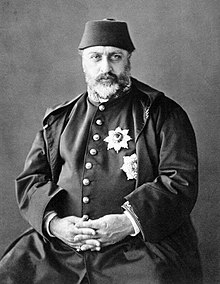| Abdulaziz | |||||
|---|---|---|---|---|---|
| Ottoman Caliph Amir al-Mu'minin Custodian of the Two Holy Mosques Khan | |||||
 Photo by Abdullah Frères | |||||
| Sultan of the Ottoman Empire (Padishah) | |||||
| Reign | 25 June 1861 – 30 May 1876 | ||||
| Predecessor | Abdulmejid I | ||||
| Successor | Murad V | ||||
| Grand viziers | |||||
| Born | 8 February 1830 Constantinople, Ottoman Empire | ||||
| Died | 4 June 1876 (aged 46)[1] Feriye Palace, Constantinople, Ottoman Empire | ||||
| Burial | Tomb of Sultan Mahmud II, Fatih, Istanbul | ||||
| Consorts |
| ||||
| Issue Among others | |||||
| |||||
| Dynasty | Ottoman | ||||
| Father | Mahmud II | ||||
| Mother | Pertevniyal Sultan | ||||
| Religion | Sunni Islam | ||||
| Tughra |  | ||||
Abdulaziz (Ottoman Turkish: عبد العزيز, romanized: ʿAbdü'l-ʿAzîz; Turkish: Abdülaziz; 8 February 1830 – 4 June 1876) was the sultan of the Ottoman Empire from 25 June 1861 to 30 May 1876, when he was overthrown in a government coup.[1] He was a son of Sultan Mahmud II and succeeded his brother Abdulmejid I in 1861.[3]
Abdulaziz's reign began with the Ottoman Empire resurgent following the Crimean War and two decades of Tanzimat reform, though reliant on European capital. The decade after his accession was dominated by the duo of Fuad Pasha and Aali Pasha, who accelerated reorganization. The Vilayet Law was promulgated, Western codes were applied to more aspects of Ottoman law, and the millets were restructured. The issue of Tanzimat dualism continued to plague the empire, however.
He was the first Ottoman sultan who traveled to Western Europe in a diplomatic capacity, visiting a number of important European capitals including Paris, London, and Vienna in the summer of 1867. With Fuad and Aali dead by 1871, Abdul Aziz promulgated reactionary ministries and attempted absolutist rule. In his last years as sultan, famine, economic crisis and default, diplomatic isolation, government dysfunction, and uprisings by Christian minorities culminated into a general international crisis known as the Great Eastern Crisis. He was deposed by his ministers on the grounds of having mismanaged the Ottoman economy on 30 May 1876, and was found dead six days later in mysterious circumstances.
- ^ a b Hoiberg, Dale H., ed. (2010). "Abdülaziz". Encyclopædia Britannica. Vol. I: A-ak Bayes (15th ed.). Chicago, IL: Encyclopædia Britannica Inc. pp. 21. ISBN 978-1-59339-837-8.
- ^ Garo Kürkman, (1996), Ottoman Silver Marks, p. 46
- ^ Chambers Biographical Dictionary, ISBN 0-550-18022-2, page 2